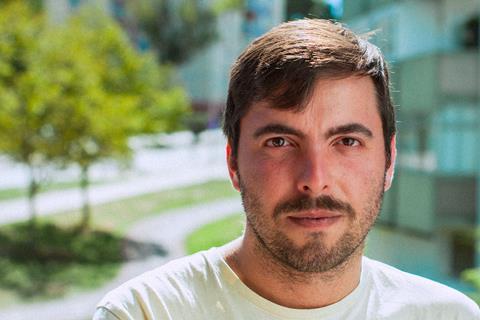
As it celebrates its 21st edition this year, Doclisboa is one of the most radical and innovative of the autumn documentary festivals. It opens today (October 19), taking place in the Portuguese capital of Lisbon until October 29.
Festival director Miguel Ribeiro prides himself on programming films with attitude and this year’s international competition includes shorts screening in the same section as features. Six are world premieres.
Whether they are dealing with politics, art or music, the titles screening in Lisbon tend to be opinionated and formally bold as the festival looks to showcase new talent and forms of cinematic expression.
On the eve of this year’s festival, Ribeiro talks to Screen about this year’s line-up.
Why did you choose to open Wang Bing’s Man In Black, about Chinese composer Wang Xilin?
Doclisboa and Wang Bing have a long and beautiful history together. The first year of the festival was the same year as Wang Bing’s first film. Since then, we have been closely accompanying the development of Wang Bing’s work. He is the most awarded filmmaker in the history of Doclisboa His films have won the best film award here twice. [Three Sisters in 2012 and Fathers And Sons in 2014].
Man In Black is a very special, unique film in his filmography…it has a dancing, musical rhythm to it. It’s a shorter film than he usually makes and its impressive how much new territory into which he ventures in such a short running time. Although Wang Bing won’t be in Lisbon, Wang Xilin, the composer will be here for the opening.
You’ve got the world premiere in competition of a very British film, Marc Isaacs’ This Blessed Plot, which is set in the Essex village of Thaxted. What led you to Isaacs?
We have shown previous works by Marc Isaacs and enthusiastically follow his work. In This Blessed Plot, he continues his very thought- provoking ways of mixing documentary and fiction. In this case, it’s through research on the relationship between Christianity and socialism from the perspective of a foreign person, a Chinese filmmaker who arrives in this village. It draws a map of Europe and the relationship between political engagement and religion. It is funny and very free in its ways of using cinematic tools.
Do you often programme UK documentaries in competition?
Yes, we always screen a lot of films from the UK across different sections. The UK has great films about artists and musicians that we always bring into the Heartbeat section/ Asif Kapadia’s ballet film Creature is playing at the festival this year.
Another notable choice are two films from Lebanese-French director Danielle Arbid, one new, one old, playing in the From The Earth To The Moon section. What is it you particularly like about Arbid’s films?
Danielle has a wonderful body of work in fiction and documentary. We will screen her first work Alone With War which questions seriously how you build the world anew after a war. In the times we are living, it asks the right questions. She went back to the rushes of this film and will be presenting a new short The Killer which asks so many questions about the transition between humanity and violence in the war context.
Talking of shorts, why do you mix short films with features throughout all of the sections? It is unusual for a festival to do this.
We stopped separating the competitions by film length in 2015. Before, we used to have a feature length competition and a short film competition but we don’t like separating them based on length. The short films you will find in this competition are just as strong as the feature length titles.
The only Portuguese film in the international competition is the archive-based doc Like The Glitch Of A Ghost from Paula Albuquerque. How do you decide whether to programme a film by a local filmmaker in either the international or Portuguese sections?
Paula’s is really a film that will open a big discussion about the ways artists can think of archive. It appropriates this colonial-based archive…[but] we don’t always have a Portuguese entry in the international competition. We like a lot the idea of having a Portuguese competition which is strong. The Portuguese competition is the place where we envision what Portuguese cinema can be today.
Post pandemic, has there been a difference in the type of films submitted - perhaps a move away from more personal and self-reflective work or achieve based docs?
Before your question, I was not even thinking in terms of proximity to a pandemic. But yes we do have those kinds of films in the line-up.
We have Monica Stambrini’s film Chutzpah. Something on Modesty, which is a deeply personal film, made mostly out of personal and intimate archives. It’s the same with [Romanian documentary] Magnificent Sky from Alexandru Badea which follows experimental Romanian composers Iancu Dumitrescu and Ana-Maria Avram. It’s heavily based on archive and is portraying the changes in the music sphere and how it impacts on the social and public life.
We are very happy to be welcoming Jerónimo Atehortúa Arteaga, the filmmaker who took over Silent Witnesses, the posthumous film of [Colombian director] Luis Ospina. He will do a performance that will use other images from the history of silent cinema in Colombia. That will be a highlight in this year’s programme.

























No comments yet